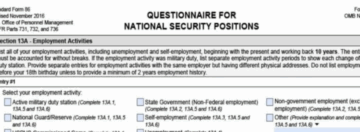Inconsistencies With Polygraph Examiners Cause Frustration

The topic of polygraph examiners bullying security clearance applicants has risen to new levels as of late. The Clearancejobsblog.com site has been peppered with stories from intelligence agency applicants depicting disbelief and frustration with their polygraph experiences. One recent applicant said he has no idea why his first two polygraphs were inconclusive because he was totally honest with everything and had nothing to hide. He is now scheduled for a third try and is scared to death of not being able to pass it. The examiner on the first two told him he was not breathing right. I know firsthand of another person who is going through this exact same scenario and had been cleared at the TS/SCI level previously while in the military.
Others have posted about how the NSA and CIA interrogate their applicants, tell them lies to get reactions, or accuse them of withholding information. Not all examiners are like this; some actually take into consideration human factors such as stress, anxiety, age, or gender, and try to get their applicants to relax. Some of the possible outcomes after taking a polygraph are:
- Significant Response (failing: reactions to relevant questions are stronger than reactions to corresponding “control” questions)
- No Significant Response (passing: reactions to “control” questions are stronger than reactions to relevant questions)
- Inconclusive (reactions to relevant questions and “control” questions are roughly the same in magnitude; in this case, a “re-test” is likely to be offered)
- No Opinion (for some reason, the polygrapher cannot render an opinion, for example, if coughing, sneezing, or something else affected the charts)
- Countermeasures (a determination by the polygrapher that the subject likely employed polygraph countermeasures)
If you are scheduled to take a polygraph it is recommended that you do not do any research on how to pass one, as this could skew your natural reactions and cause you to fail. And if you do not pass the first one, don’t give up. Ask for a retest.



I had one 2 weeks ago and the examiner was the most professional i ever had. First time i was not bullied.
@Marko, why do you believe this to be true? I know that polygraph operators prefer that subjects be ignorant of polygraph procedure. But this is because those who research polygraphy will learn that it has no scientific basis and that it instead depends on trickery (with the operator lying to and attempting to deceive the subject).
I have found no peer-reviewed research that in any way suggests that a person’s knowledge of polygraphy could “skew [their] natural reactions and cause [them] to fail.”
On the contrary, a person who researches polygraphy can learn to avoid certain behaviors that might be erroneously construed as attempted countermeasures (such as breathing slowly and regularly in an attempt to remain calm) and learn other behaviors that can mitigate the risk of a false positive outcome.
Not research, but I have seen it happen first hand. My ex husband failed his poly because he read about it being a voodoo machine and was so freaked that he was all over the chart. He made the worst decision possible and told them that was why he was terrified so they accused him of using countermeasures and that was that.
Your ex-husband might well have avoided this mistake had he researched polygraphy further.
The polygraph community is terrified of people learning about polygraphy. Telling a polygraph operator that the polygraph is a voodoo machine, or less antagonistically that you’ve read about it and understand that it lacks scientific underpinnings, invites an arbitrary accusation of having used polygraph countermeasures.
I’m not sure it would have helped. He is still a saint to this day: doesn’t drink, no weed or alcohol ever, no criminal history etc. The man admitted to picking up a penny off the street and keeping it because they were hounding him and he couldn’t think of anything he’d ever done wrong.
He lived with an unhealthy dose of anxiety at the time and even though he passed psych, his worrying got the best of him. He actually did read about that; part of what he told them was he knew they’d accuse him of using countermeasures because he was so scared of the polygraph not being even vaguely scientific, and lo and behold that’s what they did. (This was in 2007)
At a minimum, it’s a prime example of worrying a future into existence.
I had the worst absolute polygraph experience last week. I almost cried. Was told i failed, brought back again, told I failed, but I have not received any notification from the intel agency looking to hire me as to whether I passed or not.